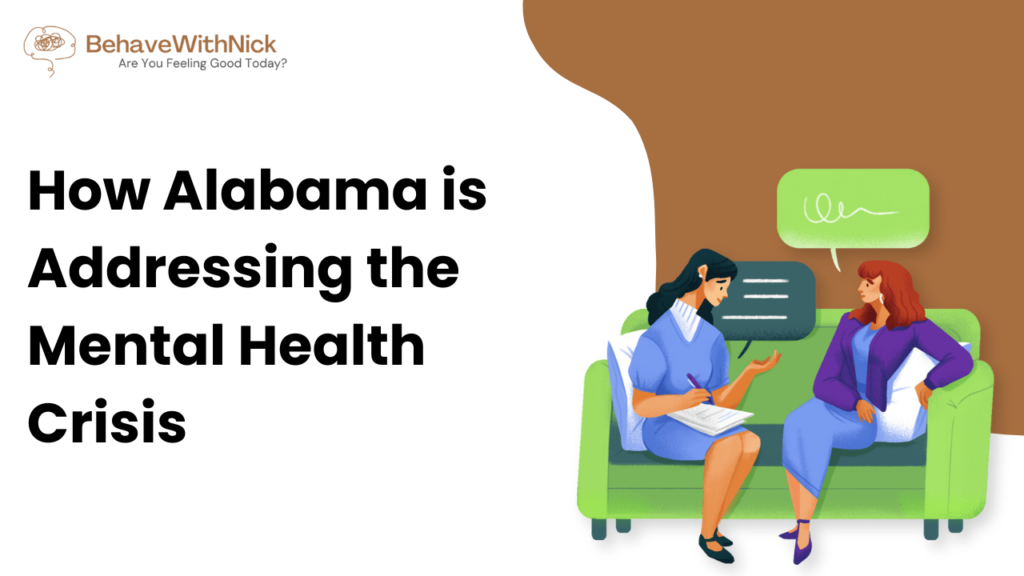Alabama is trying its best to address the needs of those with mental health issues. Many people in the state encounter difficulty accessing care due to stigma and lack of services.
Alabama is spending more on mental health issues, opening new Alabama mental health service providers and crisis centres and making telehealth available. These programs are helping people not only in the cities but also in the countryside.
As with everything else, there are still problems like insufficient mental healthcare providers and control over substance abuse disorders. However, there is a continuous effort by the State of Alabama to make it work, and progress is already evident.
The Scope of the Mental Health Crisis in Alabama
Mental health issues affect many people in Alabama, with over 850,000 residents experiencing conditions like anxiety, depression, or bipolar disorder. The state also struggles with one of the highest rates of opioid misuse in the country.
Alabama ranks 46th in the nation for access to mental health care due to limited funding and a shortage of providers. Rural areas are especially affected, making it harder for many people to get the help they need.
Key Challenges in Addressing Mental Health in Alabama
Shortage of Mental Health Professionals
Alabama does not have enough mental health providers, with only 12 psychiatrists per 100,000 residents compared to the national average of 16. Rural areas are the most affected, and many people have to travel hours to get care.
Stigma Surrounding Mental Health
Many people in Alabama avoid seeking mental health care because of stigma and fear of being judged. This is especially common in rural areas, where open discussions about mental health are rare.
Inadequate Funding
Alabama has not invested enough in mental health programs, leading to fewer treatment centers and long wait times. Recent funding increases are helping, but resources are still limited for crisis services.
High Rates of Substance Abuse
Opioid addiction and other substance use disorders make the mental health crisis worse. Alabama’s high opioid prescription rate has caused many addiction-related mental health problems, but integrated care for both issues is still lacking.
Steps Alabama Is Taking to Address the Mental Health Crisis
Increased State Funding
Alabama has increased its mental health funding, with $135 million allocated in 2023 to expand community services, crisis centers, and school programs. Federal grants are also being used to fight opioid addiction and improve treatment options.
Crisis Centers
The state has opened four crisis centers in Birmingham, Mobile, Montgomery, and Huntsville. These centers provide 24/7 care for emergencies, helping reduce pressure on hospitals, jails, and law enforcement.
Also read: Kids Behaviour Therapy
School-Based Programs
Alabama is adding counselors and mental health coordinators in schools to support students. Schools are also teaching kids about emotional health and using trauma-informed practices to help those with difficult experiences.
Telehealth Services
Telehealth allows people to see therapists or psychiatrists without traveling far. Alabama is improving internet access and encouraging insurers to cover virtual appointments to make care easier for rural residents.
Community Outreach
Awareness campaigns and programs are helping reduce mental health stigma. Faith-based groups and peer support networks are encouraging open conversations and supporting those in need.
Substance Abuse Programs
The state is fighting the opioid crisis by reducing prescriptions, expanding naloxone access, and offering medication-assisted treatment. New programs are addressing mental health and substance abuse together for better results.
Remaining Challenges and the Path Forward
Alabama still faces challenges, including a shortage of mental health providers, especially in rural areas. Attracting more professionals may require incentives like loan repayment programs and other support.
Expanding Medicaid could make mental health care more affordable for low-income residents. The state also needs to invest in long-term solutions, such as preventive care and addressing the link between mental health and the criminal justice system.
How You Can Help
Everyone can play a part in helping with Alabama’s mental health crisis. Here are a few simple ways to make a difference:
- Speak Up for Change: Support policies that increase funding for mental health care, expand Medicaid, and make telehealth more accessible.
- Talk About Mental Health: Share your thoughts and encourage open conversations to reduce stigma in your community.
- Give Your Time or Resources: Volunteer with or donate to local organizations that offer mental health support, like crisis centers or peer support groups.
Conclusion
Alabama is making progress in tackling its mental health crisis through increased funding, crisis centers, telehealth, and school programs. These steps are helping more people access the care they need.
However, challenges like provider shortages and affordability still need attention. Continued teamwork between policymakers, healthcare providers, and communities is key to creating a stronger mental health care system.


